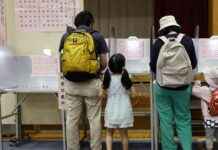The elected officials had until midnight Thursday evening to agree after months of political deadlock. But this deadline was exceeded without finding an agreement. Northern Ireland should therefore soon experience early elections. British media have indicated that they could be held in mid-December.
The political stalemate is due to the fact that the unionist DUP party, opposed to the post-Brexit provisions, refuses to participate in the local assembly, preventing the formation of an executive which must be shared with the Republican Sinn Fein, victorious in the elections. local in May.
The hopes of a compromise at the assembly, which met Thursday at midday, were dashed even before the start of the session by the leader of the DUP Jeffrey Donaldson.
“We don’t consider there has been enough progress,” he said.
He recalled that the DUP’s position “remains the same” as since May, namely that the party “would not participate in an executive until decisive action was taken on the protocol”.
– Border puzzle –
Unionists, attached to Northern Ireland’s membership of the United Kingdom, are calling for the repeal of this agreement negotiated between London and Brussels at the time of Brexit, which establishes a special customs status for the province to avoid the return of a physical border with the neighboring Republic of Ireland.
According to them, the protocol undermines the integrity of the United Kingdom because it creates a de facto customs border between Northern Ireland and the rest of the country.
The DUP boycott is blocking local institutions. Because even if it is Sinn Fein – favorable to a reunification of the island of Ireland – which won the elections in the province in May, the peace agreement of 1998 which put an end to three decades of conflict stipulates that the executive must be shared between Unionists, especially Protestants, and Republicans, mostly Catholics.
“At a time when so many workers, families and businesses are suffering from the cost of living crisis (…) people need to know that they can count on us”, affirmed before the deputies the Northern Irish leader of Sinn Fein, Michelle O’Neill, who was due to become premier of the province in May.
“Here we are in this Chamber today,” she added. “We could appoint a president, a prime minister, a deputy prime minister and a new executive who could act immediately to put money in people’s pockets. But the DUP continues to deny the outcome of the May election. “
For lack of government, it is London that manages current affairs but many files are frozen.
– “Negotiated” solution –
“Time is running out,” said the British Minister for Northern Ireland, Chris Heaton-Harris, on Wednesday evening, repeating that he would call an election for lack of agreement by midnight Thursday evening. He traveled to Belfast on Wednesday to convince the different parties to come to an agreement. In vain.
“We urge (the DUP) to return to the assembly because the people of Northern Ireland deserve an elected and functioning local executive,” Downing Street insisted on Thursday.
London wants to renegotiate the agreement with Brussels, which only accepts minor adjustments. Previous British governments introduced a bill unilaterally changing the protocol, drawing the wrath of Brussels.
Faced with this crisis in his first week in office, the new British Prime Minister Rishi Sunak discussed the subject with his Irish counterpart Micheal Martin and the President of the European Commission Ursula von der Leyen. He assured them that he preferred a “negotiated solution”.
In the meantime, the leader of the DUP Jeffrey Donaldson said he was “ready to embark on the electoral battle”, less than six months after the last ballot. He even warned that the party’s election propaganda had already been approved.
The defeat of his party in the last elections reflects a fundamental trend in the British province, created initially for Unionist Protestants: Catholics are now more numerous there, according to a recent census, which is likely to encourage supporters of reunification with the Republic of Ireland.








